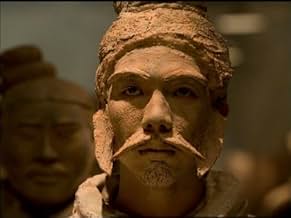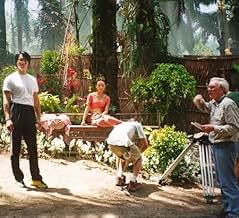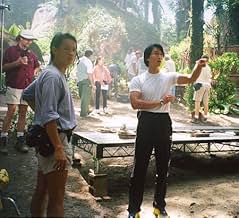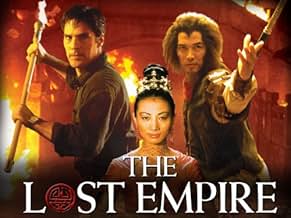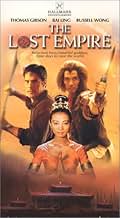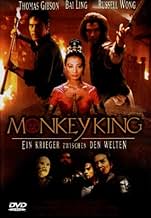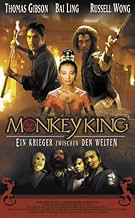NOTE IMDb
5,5/10
1,8 k
MA NOTE
Ajouter une intrigue dans votre langueAmerican journalist seeks lost Chinese manuscript, journeying with magical humanoid ape, pig-man, and ex-cannibal friend. Adventure based on renowned tale.American journalist seeks lost Chinese manuscript, journeying with magical humanoid ape, pig-man, and ex-cannibal friend. Adventure based on renowned tale.American journalist seeks lost Chinese manuscript, journeying with magical humanoid ape, pig-man, and ex-cannibal friend. Adventure based on renowned tale.
- Nommé pour 1 Primetime Emmy
- 4 nominations au total
Parcourir les épisodes
Avis à la une
The Lost Empire is a excellent updating and play off a an ancient Chinese novel entitled "Journey to the West".
For viewers who have some knowledge of Chinese myths and stories this movie is a real treat. It brings back all the wonderful characters of one of the most beloved novels of childhood.
On the other hand if you don't have a clue who the Monkey King was, let alone the celestial Kingdom and the Jade Emperor, than you might not get the underlying story elements, but the movie should still be a great deal of fun simply as a great adventure story with wonderful special effects and some very amusing characters.
This movie can be enjoyed by young and old. Think of it as an Asian version of Wizard of Oz, Ben Hur and Indiana Jones all rolled into one.
For viewers who have some knowledge of Chinese myths and stories this movie is a real treat. It brings back all the wonderful characters of one of the most beloved novels of childhood.
On the other hand if you don't have a clue who the Monkey King was, let alone the celestial Kingdom and the Jade Emperor, than you might not get the underlying story elements, but the movie should still be a great deal of fun simply as a great adventure story with wonderful special effects and some very amusing characters.
This movie can be enjoyed by young and old. Think of it as an Asian version of Wizard of Oz, Ben Hur and Indiana Jones all rolled into one.
Yes, the weaknesses of this movie are numerous. The acting is, for the most part, horribly wooden, particularly with the lesser supporting characters. The real-world history is way off (among other flaws already pointed out in other reviews, "Journey to the West" is, according to what I've read at least, closer to 400 years old than 500, and the official objection to the manuscript was its nontraditional form rather than its content). Some of the characters, particularly four of the Five Traditional Masters, are way underdeveloped. Portraying Confucius as a self-serving sycophant is just *wrong.*
If you're already familiar with the original story of "Journey to the West" and can't bear to see it butchered -- which is exactly what happens here -- then follow the one-star ratings given here and avoid this movie like the plague.
For anyone else, this is a fun piece of work. It was hardly Emmy-worthy in any category (with the possible exception of Bai Ling's impassioned performance as the Goddess of Mercy) and has numerous plot holes not worthy of David Huang, but the story travels on well with only a couple of relatively minor diversions (well, I guess NBC wanted to make sure they had a good two-part miniseries), one can really care about those characters that do receive proper development, and can wonder and worry about the story's outcome.
If you're already familiar with the original story of "Journey to the West" and can't bear to see it butchered -- which is exactly what happens here -- then follow the one-star ratings given here and avoid this movie like the plague.
For anyone else, this is a fun piece of work. It was hardly Emmy-worthy in any category (with the possible exception of Bai Ling's impassioned performance as the Goddess of Mercy) and has numerous plot holes not worthy of David Huang, but the story travels on well with only a couple of relatively minor diversions (well, I guess NBC wanted to make sure they had a good two-part miniseries), one can really care about those characters that do receive proper development, and can wonder and worry about the story's outcome.
Lost Empire, a VERY strange title for a retelling of the old Chinese classic adventure "Journey to the West", is a mixed bag of a film. David Hwang's screenplay is in many respects a sequel to the original story, as opposed to being a modern rendition of the original story. I regard this as a mistake as I believe Mr. Hwang lost more by giving up on the original characters than he gained by having a modern setting.
Good points: The lovely Ling Bai did a good job as the Bodhisattva of Compassion (Kwan Yin). Some scenes with Monkey and the "Scholar from Above" went well (mainly the scenes when Monkey rescues his subjects on Flower Fruit Island). Some interplay between "Sandy" and the "Scholar from Above" was funny. Some of the art design for the palace of the Jade Emperor was good (but NOT the throne room, yuk!).
Bad points: Too many explosions. A really ugly and totally wrong portrait of Confucius (I could go on for some time but I'll stick with this key point: Confucius was a materialist. He had no interest in religion and spirits. He was only interested in how a good state was run. The depiction of Confucius in this movie is totally at odds with EVERYTHING that Confucius stood for.) The last half-hour of the movie was anti-climactic, over-wrought, and uninteresting.
Deeper problems: Journey to the West is, at its core, at Buddhist story about the quest to attain enlightenment (along with the fun stuff about beating demons). This story (Lost Empire) takes place AFTER Monkey and Sandy have achieved their ultimate state. They are both "supposed" to be enlightened beings. The problem with this is that a) they don't act like enlightened beings, and b) there isn't much drama possible when you are enlightened. You can really tell the weakness in the writing when Kwan Yin has to tell Monkey's old teacher that "Monkey HAS been blessed by the Buddha". If you need a 3rd party (a goddess no less) to convince other people that you have become enlightened and have been blessed by the Buddha, well, its clear to me that the story is saying one thing, but doing another.
In fact, none of the characters behaves "in character". At least not like the characters that you enjoyed when reading "Journey to the West".
Deepest problem: the story (Lost Empire) is trying to both be and not be "Journey to the West" at the same time. Its trying to both be true to original ideas and be "modern" and up-to-date at the same time. Its trying to be a sequel that retells the original story. It is, in short, a total mess at a very deep level. -- Colin Glassey
Good points: The lovely Ling Bai did a good job as the Bodhisattva of Compassion (Kwan Yin). Some scenes with Monkey and the "Scholar from Above" went well (mainly the scenes when Monkey rescues his subjects on Flower Fruit Island). Some interplay between "Sandy" and the "Scholar from Above" was funny. Some of the art design for the palace of the Jade Emperor was good (but NOT the throne room, yuk!).
Bad points: Too many explosions. A really ugly and totally wrong portrait of Confucius (I could go on for some time but I'll stick with this key point: Confucius was a materialist. He had no interest in religion and spirits. He was only interested in how a good state was run. The depiction of Confucius in this movie is totally at odds with EVERYTHING that Confucius stood for.) The last half-hour of the movie was anti-climactic, over-wrought, and uninteresting.
Deeper problems: Journey to the West is, at its core, at Buddhist story about the quest to attain enlightenment (along with the fun stuff about beating demons). This story (Lost Empire) takes place AFTER Monkey and Sandy have achieved their ultimate state. They are both "supposed" to be enlightened beings. The problem with this is that a) they don't act like enlightened beings, and b) there isn't much drama possible when you are enlightened. You can really tell the weakness in the writing when Kwan Yin has to tell Monkey's old teacher that "Monkey HAS been blessed by the Buddha". If you need a 3rd party (a goddess no less) to convince other people that you have become enlightened and have been blessed by the Buddha, well, its clear to me that the story is saying one thing, but doing another.
In fact, none of the characters behaves "in character". At least not like the characters that you enjoyed when reading "Journey to the West".
Deepest problem: the story (Lost Empire) is trying to both be and not be "Journey to the West" at the same time. Its trying to both be true to original ideas and be "modern" and up-to-date at the same time. Its trying to be a sequel that retells the original story. It is, in short, a total mess at a very deep level. -- Colin Glassey
The Lost Empire, or The Monkey King, as it was called when I saw it on the Hallmark Network, is a silly film, but a very enjoyable one. It attempts to put a new spin on the Chinese classic, Journey to the West, which tells the story of how a monk went on an epic journey to recover some sacred scriptures, aided by the mischievous Monkey King, the gluttonous Pigsy and the sombre Sandy.
In this modern version the companions are the same, but the monk is replaced by a modern American sinologist, and the "scripture" is the original manuscript of Journey to the West itself, which is about to be destroyed by the "five traditional masters", who represent the forces of conservatism. Confused? It gets worse; if the book is destroyed, all the human progress that has taken place since the book was written will be reversed and the world will revert to feudalism. To cap it all, the Jade Emperor, Confucius and Kuan Yin, the goddess of compassion, are all weighing in.
With a scenario like this, the film cannot help but being absurd in places, but the absurdity, intentional or otherwise, is part of the fun, as it was in the original Journey to the West, which is a comedy as well as an analogy of the spiritual journey. Viewers who have read Journey to the West will enjoy the references to it; others can sit back and enjoy the visual richness, which as well as some spectacular scenes and SFX, includes Bai Ling as Kuan Yin, looking far more sexy than a goddess of compassion ought to (but then that's one of the twists in this tale as well).
In this modern version the companions are the same, but the monk is replaced by a modern American sinologist, and the "scripture" is the original manuscript of Journey to the West itself, which is about to be destroyed by the "five traditional masters", who represent the forces of conservatism. Confused? It gets worse; if the book is destroyed, all the human progress that has taken place since the book was written will be reversed and the world will revert to feudalism. To cap it all, the Jade Emperor, Confucius and Kuan Yin, the goddess of compassion, are all weighing in.
With a scenario like this, the film cannot help but being absurd in places, but the absurdity, intentional or otherwise, is part of the fun, as it was in the original Journey to the West, which is a comedy as well as an analogy of the spiritual journey. Viewers who have read Journey to the West will enjoy the references to it; others can sit back and enjoy the visual richness, which as well as some spectacular scenes and SFX, includes Bai Ling as Kuan Yin, looking far more sexy than a goddess of compassion ought to (but then that's one of the twists in this tale as well).
This movie is an insult to the beautiful historical classic work from Wu Cheng'en. It brutally involves theme's that do not fit at all with the story line. Such as a Caucasian man falling in love the Goddess of Mercy and she falling in love with him. Even though, in order to make one movie out a of a 3 volume work, selecting only parts from the book is necessary. This movie has misunderstood the meaning of the book and used elements to make it a sad abstract of the novel. He has gone past the key element of the book: the enlightenment, the search for the Way from five totally different characters, each representing an element of human nature. The Tang priest, Sun Wukong the monkey, lazy and clumsy Pig, hideous Friar Sand and the Dragon sun, changed into a white horse. It has wiped out every Buddhist element from the story, while that's the backbone of this book. How he ridiculed key figures from Chinese history and culture (Quan Yin, Confucius) and not even in a adult and serious way.
This movie does by no means represent the wonderful Chinese Classic `Journey to the West', or literally `Notes of a Journey to the West' and you may have already figured out that I was sadly disappointed with it.
This movie does by no means represent the wonderful Chinese Classic `Journey to the West', or literally `Notes of a Journey to the West' and you may have already figured out that I was sadly disappointed with it.
Le saviez-vous
- AnecdotesLoosely based on the story from classical Chinese Literature "Journey to the West".
- Citations
Nicholas Orton: So I might never get rich, buy my own jet, or even maintain a stock portfolio. But when I look in her eyes, I know that none of these things really matter.
- ConnexionsReferences La Mouche noire (1958)
Meilleurs choix
Connectez-vous pour évaluer et suivre la liste de favoris afin de recevoir des recommandations personnalisées
- How many seasons does The Monkey King have?Alimenté par Alexa
Détails
Contribuer à cette page
Suggérer une modification ou ajouter du contenu manquant




